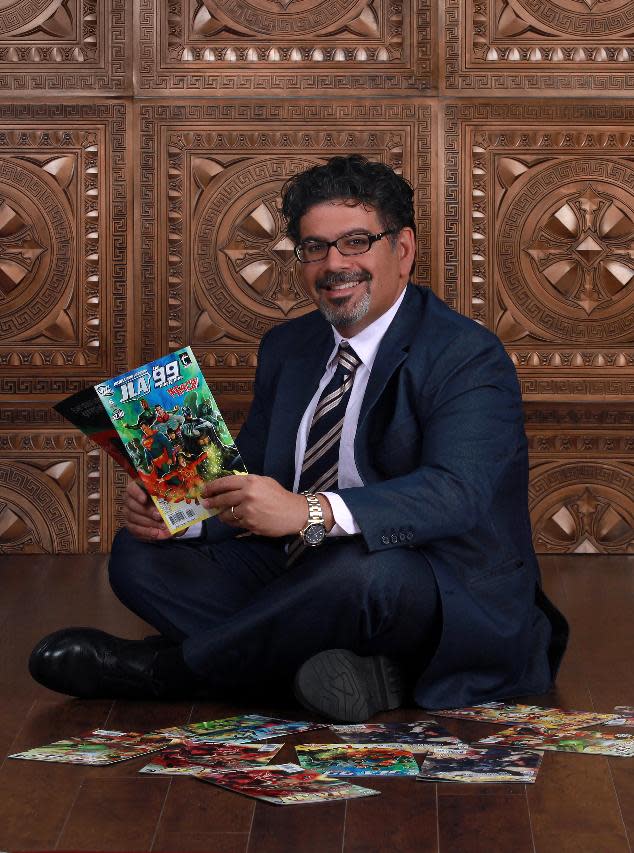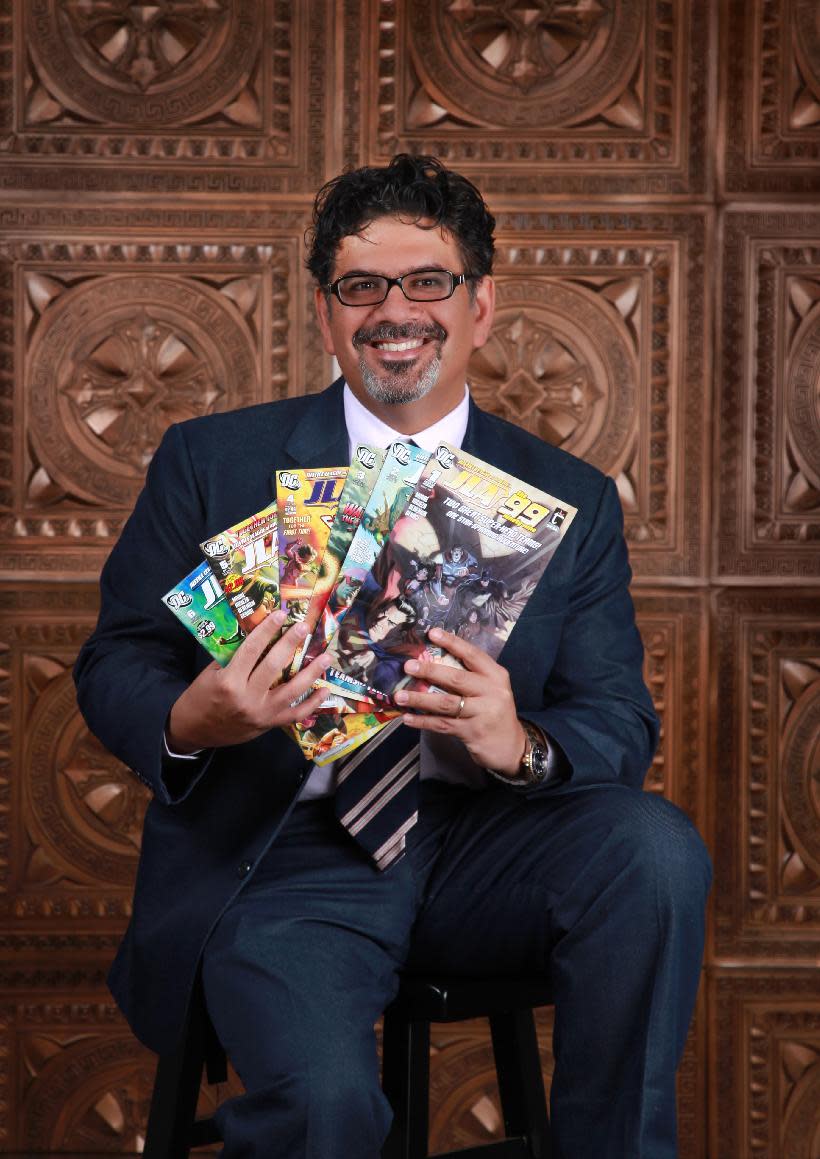Muslim comic series aims to break through in US
DETROIT (AP) — Comic book fans might call it a great origin story: In the aftermath of 9/11, a Muslim man creates a comic book series, "The 99," inspired by the principles of his faith. It builds a global audience and investors contribute millions for it to continue and expand.
In two vastly different cultures, Naif Al-Mutawa's tale hits a few roadblocks — "villains" if you will: Censorship from Saudi Arabia, home to the main Muslim holy sites; in the United States, a struggle to build an audience where free expression has been hampered by a post-9/11 rise in suspicion and scrutiny of all things Islamic.
For Al-Mutawa, it's evidence that tales like his are needed to counter hardline, intolerant ideologies of all stripes.
"That's one of the things that was most disappointing to me in the beginning," Al-Mutawa said on a recent visit to Detroit. "You have two birthplaces: You have the birthplace of Islam, which initially rejected it (and) the birthplace of democracy and tolerance, this country, that I'm now facing resistance in — the two natural places for this product."
Al-Mutawa's reputation in the Middle East and elsewhere has grown since the 2006 debut of "The 99," as well as its rollout into animation. The series is named for the 99 qualities the Quran attributes to God: strength, courage, wisdom and mercy among them.
The comic book spawned a TV series and 26 half-hour episodes of the 3-D animated version of the "The 99" have been sold to broadcasters. They are expected to be released early next year in more than 50 countries, and a second season is in production.
Al-Mutawa, a U.S.-educated psychologist from Kuwait, has been promoting "Wham! Bam! Islam!" a PBS documentary that tells the story of "The 99" from an idea hatched during a cab ride to its raising of $40 million in three calls for investors. The promotional push is supporting the animated series, the vehicle by which his company hopes to turn a profit.
"The 99" grew out of his childhood love of Batman, Superman and their superhero brethren, along with a desire to provide role models for his five young sons.
"Basically, 'The 99' is based on Quranic archetypes, the same way that Batman and Superman are based on Judeo-Christian and Biblical archetypes. And just like Batman and Superman are secular story lines, so too are 'The 99,'" he said.
"It seemed to me that the only people using mass media when it came to things to do with religion — at least my religion — were people who were doing very destructive things. So the question was how do I challenge that in a way that's secular yet cannot be dismissed as Western?"
Critics on both sides of the religious and cultural divide see subversion in Al-Mutawa's superheroes. Some hardline Muslims say the series subverts their faith by embodying the attributes in human characters, while a few non-Muslim American critics have labeled it sneaky Islamic indoctrination.
Al-Mutawa said it took investment by an Islamic investment bank to make his series "halal," or acceptable to Saudi officials. The nation's government-run broadcaster has since bought the rights to the animated series. So has The Hub cable network in the U.S. — though the latter has indefinitely postponed airing it after some critical columns and blog posts.
"One of the comments on the blogs that ended up delaying us was someone who warned that we can't let the Muslims brainwash our children like the Mexicans did with 'Dora the Explorer,'" Al-Mutawa said.
Still, he's measuring broader acceptance in other ways. Al-Mutawa worked with DC Comics last year on a six-issue crossover that teamed "The 99" with The Justice League of America.
"They start out with distrust between the two teams of superheroes — Superman punches one of my guys early on," Al-Mutawa said. "And then they figure out during the arc that it's the bad guys causing the distrust."
Robin Wright, author of "Rock the Casbah: Rage and Rebellion Across the Islamic World," said Al-Mutawa has "been way ahead of the curve in figuring out how you challenge extremism and how you create alternative role models to Osama bin Laden or Hassan Nasrallah (Hezbollah's leader) for kids and adults."
Muslim characters are rare in U.S. comic books but there have been some inroads.
Marvel Comics has Dust, a young Afghan woman whose mutant ability to manipulate sand and dust has been part of the popular X-Men books.
"I don't view a Muslim superhero as avant garde," Marvel editor-in-chief Axel Alonso said. "Muslims comprise approximately 23 percent of the world's population, and we like our comics to reflect the world in its diversity."
Dust wears a robe and veil to observe Muslim hijab, or modest dress. Another character, M, is a woman of Algerian descent who only recently revealed her faith in the pages of "X-Factor." Like millions of other Muslim women in the real world, she "does not observe hijab, and often dresses quite provocatively," Alonso said.
Other characters have not been so accepted. In late 2010, DC Comics introduced Nightrunner, a young Muslim hero of Algerian descent raised in Paris. He's part of the global network of crime fighters set up by Batman alter-ego Bruce Wayne. Conservative bloggers decried the move, noting that instead of tapping a native French person, they opted for a minority.
Frank Miller, whose dark and moody take on Batman in "The Dark Knight Returns" in 1986 energized the character, has taken a different tack in his latest work, "Holy Terror," which tells the story of The Fixer and his efforts to stamp out Islamic terrorists.
The graphic novel initially took root as a look at Batman's efforts to fight terrorism, something that grew out of Miller's experiences of being in New York during 9/11. As he worked on it, it became apparent that it wasn't suitable for the DC character.
"As I developed it and worked on it, the subject was too serious and the character's actions were not Batman," he said.
The book has been criticized as anti-Islamic propaganda, but Miller says that's not his notion.
"I lived through a time when 3,000 of my neighbors were incinerated for no apparent reason. I lived through the chalky, smoky weeks that followed and through the warplanes flying overhead and realized that, much like my character, The Fixer, I found a mission," he said.
As for "The 99," he said has not seen it but welcomes Al-Mutawa's efforts.
"I come in with my own very pro-Western-they-attacked-my-city-point of view," Miller said. "If other people have other points of view to bring in, I just welcome it."
Al-Mutawa called "Holy Terror" par for the historical course for Islam.
"There's no denying that terrible things have happened in the name of my religion — as they have in the names of most religions, if not all religions," he said. "As human beings, we're a little bit lazy. We don't like to change the schemas in our minds. We like to fit new information into existing schemas. That's why to some people anything to do with Islam is going to be bad."
___
Matt Moore contributed to this report from Philadelphia.
___
Marvel is owned by The Walt Disney Co.; DC Comics is a unit of Time Warner Inc.


